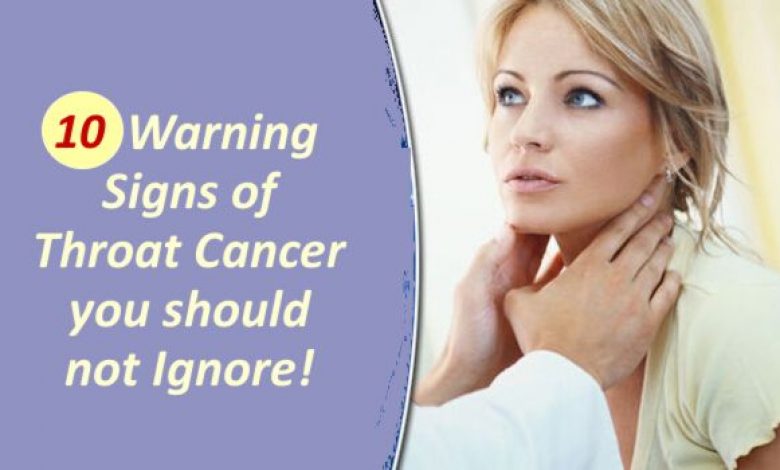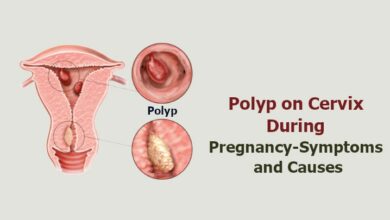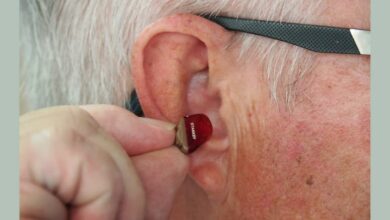10 Early Signs and Symptoms of Throat Cancer should Never Ignore

It is tiime to know about early signs and symptoms of throat cancer. Uncontrollable growth of harmful cells in the throat can cause cancer. The throat is the muscular tube start from the back of your nose and ends in the neck. Cancer on the throat develops in the fat cells that line up your throat. Cancer spread to other organs that help you in speaking and breathing. The throat has several parts that can develop cancer. This type of cancer affects the larynx, pharynx, and the section behind the nose, leading to the stomach and the lungs.
What is Throat Cancer?
Throat cancer is a kind of cancer in which cancerous tumors occur in your throat (pharynx), voice box (larynx), or tonsils. Suffering from persistent cough, pain in the throat or ears, difficulty swallowing, or lumps/boils that are not healing can be symptoms of throat cancer.
Radiation therapy can cure throat cancer if detected at an early stage. The tumor can be removed through surgery. In some situations, all / part of the voice box or part of the throat must also be removed by surgery. Chemotherapy is done to kill cancer cells using certain drugs.
This type of cancer can also affect your cartilage which acts as a lid for your windpipe. Another type of throat cancer-Tonsil cancer, affects the tonsils that are located behind your throat.
The best way to fight any deadly disease is by catching it early when it is more likely to be treated.
Throat cancer can progress rapidly; that is why treating it early on can increase the survival chances. The issue is that with most types of cancers, there are very mild symptoms in the beginning. A trip to a doctor should be your priority if you observe any of the following ten signs of throat cancer.
Early Signs and Symptoms of Throat Cancer
Here are some warning signs of throat cancer
1. Difficulty in swallowing
2. Soreness in the throat
3. Changes in voice such as hoarseness
4. Sudden weight loss
5. Bleeding in the nose and mouth
6. Blood in the cough
7. Swelling in the neck or eyes
8. Pain while swallowing
9. A lump that doesn’t go away
10. Pain in the ear
Throat cancer symptoms are mainly specified by the location of the tumor in the head and neck region. Particular spread of throat cancer to nearby tissues in the pharynx and larynx can steer to these common symptoms
1. Difficulty in Swallowing
Trouble swallowing is one of the early reported warnings signs and symptoms of throat cancer. Often people feel pain while swallowing or a burning irritation when eating and swallowing food. It is also a very important sign of throat cancer. People usually try to eat soft food when there is a sore throat but do not go to the doctor, which is not correct.
2. Soreness in the Throat
This is the most common indication of early signs and symptoms of throat cancer. Cancer in the pharynx can result in pain or discomfort in your throat that is not overcome by swallowing.
If there is a sore throat and blood comes in the cough, then pay attention. It doesn’t need to be cancer, but it is essential to take precautions, especially if the phlegm persists for a long time.
3. Voice Changes
Significantly, those who have cancer in their throat show changes in their voice and symptoms of sitting down the throat.
4. Sudden Weight Loss
Like all cancer, unexplained weight loss is a prevalent symptom. It is vital to note that weight loss may worsen by difficulty chewing due to severe swallowing.
5. Swelling in the Neck
Swelling in the neck is a sign that your body is struggling with a disease, so it’s not shocking that some people sense a lump in their neck by an enlarged lymph node.
6. Pain in the Ear, Throat, and Head
Significantly, if pain persists in your ear, throat, and head for a long time, do not ignore it at all.
That is because it is the earliest symptom of throat cancer. Yes, after getting cancer, the throat gland swells and starts to ache.
How to Prevent Throat Cancer?
There is no sure way to prevent throat cancer, but you can reduce your risk in the following ways –
1. Do not Smoke
Use products that help you quit cigarettes, such as nicotine patches or chewing gum, or talk to your doctor about drugs that help you quit cigarettes/bidis, to help you quit cigarettes/bidis.
2. Stop Drinking or Reduce Alcohol
Although drinking alcohol is very bad for health, if you drink alcohol, then drink it in limited quantities, or it is better to stop drinking at all.
3. Maintain a Healthy Lifestyle
Eat rich fruits, vegetables, and low-fat meats and reduce sodium intake. If you are overweight, reduce it. Exercise at least 150 minutes a week.
4. Reduce the Risk of HPV
HPV is known to cause throat cancer. To protect yourself from this, limit your number of sexual partners and have safer sex.
Types of Throat Cancer
Even though all throat cancers involve the abnormal growth of cells, but your doctor still needs to identify the specific type for the most effective treatment option.
Throat cancer can progress to many parts, and different terms are used to specify the part of the throat where cancer develops.
Oropharyngeal CancerThis type of cancer occurs behind your mouth. Cancer grows in the back of the tongue and the tonsils.
1. Supraglottic cancer
Cancer begins in the upper part of the larynx and affects the epiglottis, blocking food from entering the windpipe.
2. Nasopharyngeal cancer
This cancer occurs in the part of your throat just behind the nose.
3. Subglottic cancer
Cancer begins from the lower part of the voice box just below the vocal cords.
4. Oropharyngeal cancer
It develops in the oropharynx, which is the part of your throat behind your mouth, including your tonsils.
5. Hypopharyngeal cancer
This cancer develops in the lower part of your throat, just above your esophagus and windpipe.
6. Glottic cancer
This type develops in the vocal cords.
Throat Cancer Stages
The different stages in Throat Cancer are defined as follows.
- Stage 0: Cancer has not spread to any other tissue or organ apart from your throat.
- Stage I: The tumor is lesser than 7 cm and has only developed in the throat.
- Stage II: The tumor has grown larger than 7 cm; however, it remains in the throat.
- Stage III: Cancer has spread to other tissues.
- Stage IV: Cancer has now progressed and spread to other organs in the body.
Throat Cancer Diagnosis
How is throat cancer tested? To diagnose throat cancer, your doctor will first ask about your symptoms and undergo a physical examination. They will also feel a lump in your throat.
You may have to undergo any of these tests
1. Endoscopy
In endoscopy, the doctor recognizes a thin, flexible tube in your throat, next to which the camera (endoscope) is placed into your throat.
2. Biopsy
In a biopsy, your doctor will employ a surgery, endoscope, or pointer to eliminate a tissue from your throat and test for cancer.
3. Imaging test
X-rays, CT scans, MRIs, and PET scans can show whether cancer has reached beyond your throat to other parts of your body.
What is the Treatment for Throat Cancer?
Surgery, radiation therapy, or chemotherapy are used to treat throat cancer. In some cases, you may need more than one treatment, which depends on the stage of cancer and your health. Your doctor will decide which option would be appropriate for you.
Following are the treatments for throat cancer
1. Radiation Therapy
To eliminate cancer cells, use a high-energy beam of radiation, X-rays, or other sources. For a tumor that is small and diagnosed early, you may only need radiation treatment. For later stages, you may also need another treatment with radiation therapy.
2. Surgery
Several types of surgery are used to remove the tumor of the throat. For early-stage tumors on the surface of your throat or oral ropes, your doctor may use an endoscope.
For larger tumors, your doctor may have to remove part of your throat and then fix it so that you can swallow normally. A tumor on the larynx may require you to remove part or all of the larynx.
If cancer spreads to your neck, you may have to have lymph nodes removed.
3. Chemotherapy
Your doctor uses chemotherapy drugs to eliminate cancer cells. Sometimes, it is used to shrink the tumor before surgery or eliminate the last cancer cells. It can also help make radiation more effective.
4. Targeted Drug Therapy
For some throat cancers, doctors may use new drugs that eliminate the achievement of the elements needed to make the tumor grow.
What Puts you at High Risk of Throat Cancer?
Even though the specific cause of throat cancer is still unclear, cancer in the throat happens when normal cells keep multiplying uncontrollably and cause a tumor. Several reasons can put you at a high risk of developing throat cancer. Some of those are:
- Using too much tobacco for a long duration. People who tend to smoke and chew tobacco are at the biggest risk of getting cancer of the throat and even some other types.
- If a person is drinking too much alcohol, then he/she is vulnerable to develop throat cancer.
- Human papillomavirus or HPV, a sexually transmitted virus, is also linked to cancer in the throat, including tonsil cancer. Kids between the ages of 11-12 can be protected against HPV through vaccination.
There are many other risk factors which include
- Exposure to chemicals
- Old age, generally after the 60s
- Men are at higher risk as compared to women.
- Genetic Syndromes
- Exposure to asbestos
- Poor dental hygiene
Prevention is Better than Cure
There are no specific methods and ways to prevent throat cancer, but you can reduce the risk of developing this deadly disease.
- If you have been smoking a lot, you should quit it, and if you don’t smoke, then do not think of starting it. Yes, quitting smoking can be difficult, but you can get appropriate help. An expert can advise on various methods that can help you quit smoking, such as meditations and products to replace nicotine.
- Consuming alcohol in moderation is fine, but having too much of it daily can be lethal for your health and put you at risk of developing diseases, including throat cancer.
- Select a healthy and nutritious diet that includes a lot of veggies and fruits. The antioxidants in these foods can reduce the risk of developing cancer of the throat and many other types.
- Throat cancer is also caused by HPV. You can save yourself by limiting the sexual partners and using protection. Also, make sure to vaccinate your children when they are young.
The general cancer screening for the throat isn’t available, but people at higher risk for developing it should see their doctors if any Signs of throat Cancer raise suspicion. Any delay in consulting a physician can cost your life, so do not wait for the warning signs to go away.
In Closing
Many of the early signs and symptoms of throat cancer will not ensue in a diagnosis of throat cancer. Still, it is good to remain vigilant about changes to the color and texture of your mouth and throat.
You should immediately consult a doctor if you observe any new signs and symptoms that are not going away.
As most of the symptoms can have other reasons, the doctor will first examine the most common causes.





